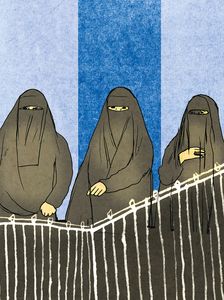The plan of the All India Muslim Personal Law Board (AIMPLB) to set up a shariah court (Darul Qaza) in every district of India is an illogical and regressive decision. This will not only complicate religion-based, personal law jurisprudence in India, but also work against the ambition of implementing a uniform civil code in the nation.
The arguments put forward by the AIMPLB make us feel that the plan is innocent and objective, as it is based on a righteous motive to lessen the burden of litigation in Indian courts, which are reeling under the burden of millions of overdue cases. Shariah courts, AIMPLB claims, are not ‘courts’ or any parallel legal system; rather they are the Darul Qaza or ‘house of consultations’, where experts of Islamic laws guide and advise Muslims who submit their personal disputes to them for arbitration, as suggested under the Arbitration and Conciliation Act. Further, Zafaryab Jilani, member of the AIMPLB, maintains that the Darul Qaza is “legal and upheld by the Supreme Court” and that the same is a “100 per cent constitutional exercise”.
However, the arguments are as specious as they are pernicious. First, the shariah courts are neither created nor sanctioned by any law in India. The Supreme Court judgment that Jilani refers to actually ruled that a shariah court has no legal sanction and that clerics have no authority to enforce its rulings. All the court had said was that the Darul Qaza cannot be banned. On July 7, 2014, the two-judge bench, headed by Justice C.K. Prasad, had ruled: “The object of establishment of such a court may be laudable but... is bereft of any legal pedigree and has no sanction in laws of the land. They are not part of the corpus juris (body of law) of the state.”
Therefore, it is obvious that the AIMPLB is misquoting the judgment and assigning wrong imputations. In fact, the board is overlooking subsequent rulings and judgments where the Supreme Court has slammed such practices. In February 2015, the Supreme Court had come down heavily on a public interest litigation, filed by advocate Clarence Pais, where he had sought legal approval to the decrees of the ecclesiastical courts issued on Christian personal law matters. A bench headed by Justice Vikramjit Sen had ruled: “This cannot be accepted, otherwise every religion will say it has a right to decide various issues as a matter of its personal law....We have to stamp out religion from civil laws.”
Apart from the legality of religious courts in a democratic society, such a move is fraught with dangerous implications that may harm the very fabric of secularism in India. The spirit of secularism demands that the mundane affairs of life should be free from religious ordainments. However, by establishing shariah courts and encouraging Muslims to settle their disputes through religious institutions employing qazis and muftis, the AIMPLB is attempting to keep the collective consciousness of Muslims ever infused with sentiments of religious attentiveness, which would prevent the community from secularising itself and integrating with the mainstream. This would help neither India, nor the Islamic community.
This warrants a greater need to implement a uniform civil code in the country, ensuring a swift, simple and inexpensive justice delivery system to address everyone’s legal concerns in a fair and equal manner through modern and secular means.
Lekhi is member of Parliament • forthwriteml@gmail.com


